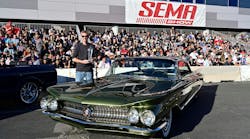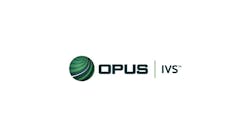The U.S. House of Representatives Judiciary Committee held a hearing March 22 on the proposed Access to Repair Parts Act that would create an exemption in design patent law for aftermarket crash parts.
The bill, introduced by Rep. Zoe Lofgren (D-Calif.) and dubbed the "Access to Repair Parts Act," would provide an exemption in copyright law for aftermarket crash parts. The bill states that "It shall not be an act of infringement of any design patent to make, use, offer to sell, or sell within the United States or import into the United States any article of manufacture that itself constitutes a component part of another article of manufacture, if the sole purpose of the component part is for the repair of the article of manufacture of which it is a part so as to restore its original appearance."
The issue pits aftermarket parts suppliers and insurance companies against OEMs and some repairers. Insurers and suppliers claim that OEMs want a monopoly on replacement crash parts, and that without competition from the aftermarket, prices would be much higher. An analysis by the Property Casualty Insurers Association of America (PCI) found that competitive crash parts save approximately $2.8 billion in insurance costs per year.
"We're for competition and consumer choice," says Lee Kadrich, vice president of government affairs and trade at the Automotive Aftermarket Industry Association (AAIA). "Absent the competition provided by the aftermarket, prices would be extraordinarily high."
OEMs, on the other hand, say they are simply protecting the patents on their vehicle designs from sub-standard knock-off manufacturers overseas, in much the same way that Gucci might try to stop the manufacture of knock-off handbags or shoes. Some repair groups, on the other hand, have focused on quality and safety issues related to aftermarket parts – particularly in light of recent demonstrations conducted by the Society of Collision Repair Specialists and the Collision Industry Conference (CIC) that indicated some parts (like bumper reinforcements ) were made from lower quality steels that may react differently than their OEM equivalents in a collision.
There has been a high spike in auto-related design patent filings in recent years, as OEMs try to keep aftermarket part manufacturers from producing and importing crash parts into the United States.
Originally introduced in 2008, the Lofgren bill was a response to a 2007 International Trade Commission decision that supported Ford Motor Co.’s complaint that Keystone Automotive Industries, U.S. Auto Parts Network Inc., and several Taiwanese manufacturers violated Section 337 of the Tariff Act of 1930. Ford asked for a cease and desist order on importation of F-150 parts (including grilles, headlamps, hoods, fenders, and tail lamps).
In a letter submitted to the Judiciary Committee, Aaron Lowe, the vice president of regulatory and government affairs at the AAIA, urged passage of the bill
"These design patents are not being used to improve the competitive advantage of a car company in the sale of their vehicles, but to capture a monopoly in the sale of the replacement parts necessary to repair the vehicles following a collision," Lowe says.
Lowe emphasized that the AAIA supports patent protection for vehicle designs and processes, but said that "providing protections for the ornamental design of a part, whether it is on the outside or inside of the vehicle, will only serve to provide the car companies with a monopoly in the aftermarket, making them the sole source for replacement parts and thus raise prices for consumers."
The Automotive Service Association (ASA), on the other hand, opposes the bill because it makes no assurances as to the quality and safety of non-OEM parts.
"There are two key issues in this debate that aren't being considered here," says Bob Redding, the ASA's Washington, D.C. representative. "Number one, parts quality, and number two, parts safety. Supporters of the bill in the Congress have shown no interest in the parts quality piece or safety piece."
"Parts distributors haven't supported it, and this bill doesn't do it," Redding says. "It creates an open season for these parts without any restrictions."
Testifying on behalf of Ford, Damian Pocari, director of enforcement and licensing with Ford Global Technologies, stated that supporters of the bill had not presented any "basis for treating visible repair parts differently than other items protected by intellectual property. There is no fundamental reason to treat a fender differently than a drug, a purse, or a movie. To do so otherwise is to devalue design.”
He added that insurance companies were basing their insurance rates on the use of OEM parts, then forcing repairers to use "cheap, copycat parts" in order to shave costs on the back end. He claims that customers frequently "receive non-Ford, non-U.S., non-UAW parts, all without disclosure or warning."
Pocari further claimed that Ford, its suppliers and dealers were losing $400 million in annual parts sales because of imported aftermarket parts.
Perry Saidman, a patent attorney and law professor who teaches design law at G.W. Law School, agreed with Ford's position, stating that if the bill passed, "it will encourage every industry that loses a design patent lawsuit to petition the Congress to … carve out an exception to their industry so that their infringement will not be actionable."
"There is almost no industry whose products or services will not cost less with increased competition," Saidman continued. He described the bill as "an argument that patents should be abolished, because patents allow the owner to monopolize a product and therefore reduce competition."
"Passage of this bill would be a dangerous precedent because it would encourage other companies and industries that specialize in knock-offs to try and do exactly the same thing," Saidman said.
Because this is an election year, and there are already a number of potentially contentious bills coming before both the House and Senate before the end of the session, it's possible that the bill will have to be reintroduced during the next legislative session.
In the meantime, the ASA has been pushing for the National Highway Traffic Safety Administration (NHTSA) to assert more authority over the safety of aftermarket crash parts. The House Committee on Energy and Commerce recently held a hearing on NHTSA's effectiveness, and the ASA drafted letters to NHTSA administrator David Strickland and members of the committee, urging NHTSA to begin regulating such parts.
There may be movement on the design patent issue in Europe, however. Kadrich said that the European Union council of ministers however may act this year on a similar proposal.
"We may be getting an open, pro-competition market in Europe this year," Kadrich says. "Without competition, it is a costly proposition for consumers to repair their vehicles. There is a lot of cost involved in allowing an OEM monopoly on parts."

